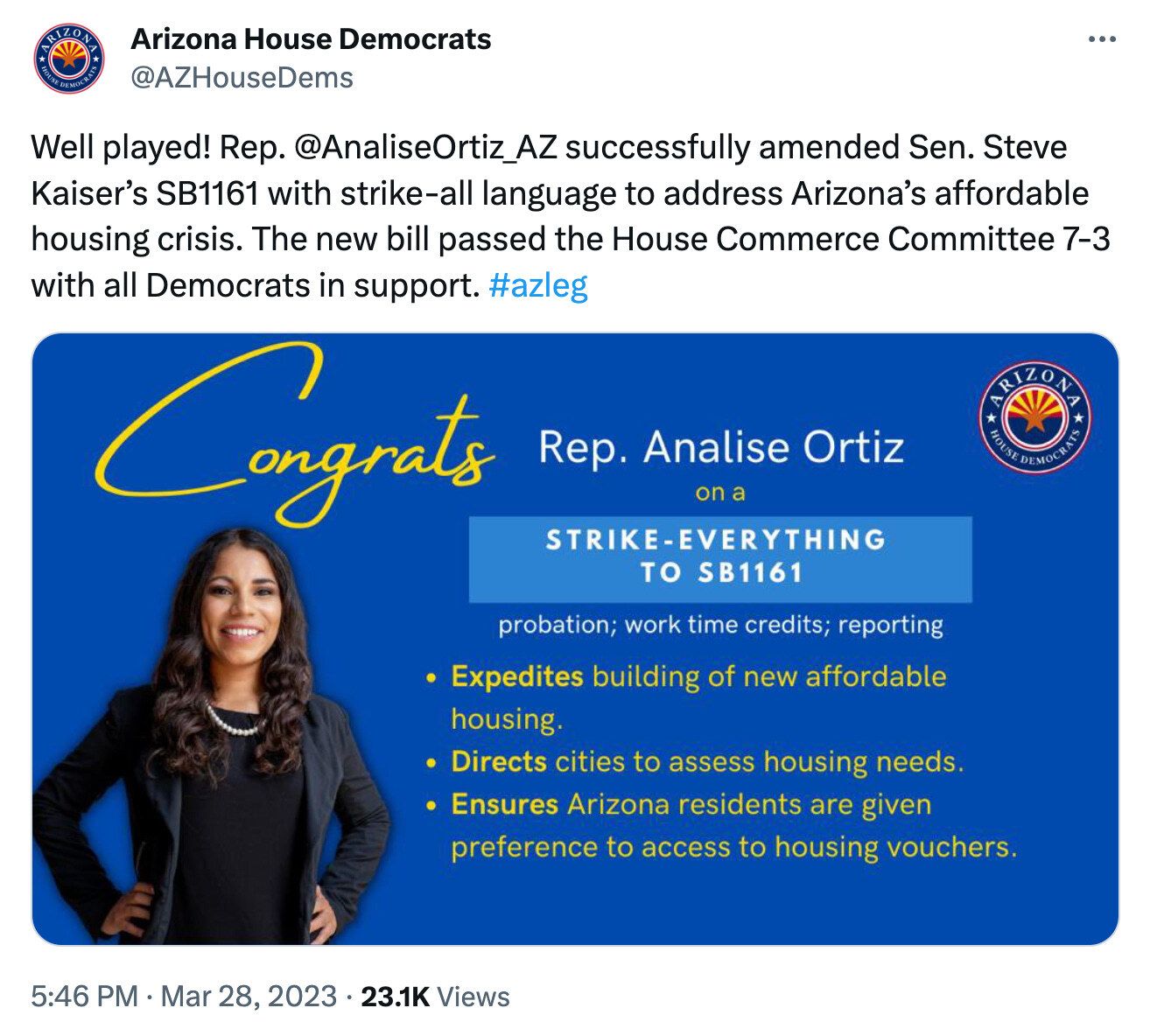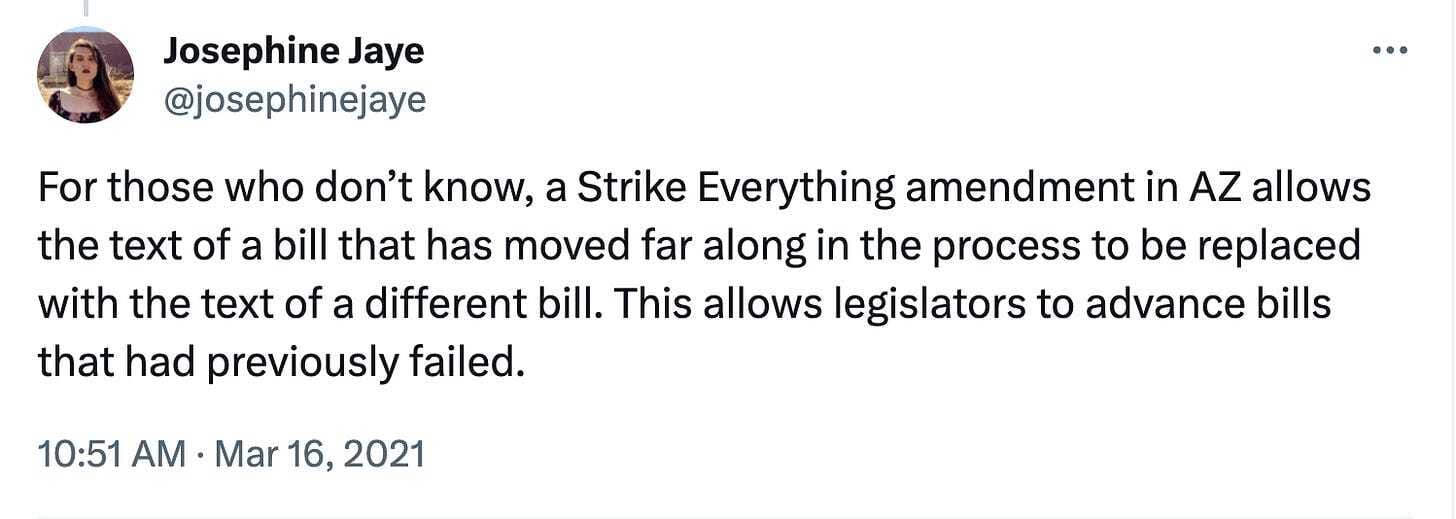Lawmakers are already pre-filing bills for the 2024 legislative session, even though some of those bills aren’t ready for prime time.
We don’t mean they’re bad ideas — though there will certainly be many of those filed in the upcoming session. We mean they’re literally not ready. The bill that’s filed is not the ultimate bill that the sponsor wants to get signed into law.
So far, this year’s most prolific bill pre-filer, by a longshot, is Republican Rep. Gail Griffin. Fifteen of the 17 bills that had been filed as of Sunday belonged to her. A few of them would hardly do anything at all.
Griffin is a bit of a legislative busybody. Last year, she sponsored 35 bills, more than twice the average. And as the chair of the House Committee on Natural Resources, Energy and Water, she often uses the Legislature’s strike-everything amendments, or “strikers”, to come up with brand new bills that circumvent the legislative deadlines that end off killing most bills.

Strikers are amendments that strike the entire content of a bill and then replace it with something completely new. A bill about water could, for example, become a bill about elections with a striker amendment.
Lawmakers have long relied on that legislative loophole to hide legislation from the public until the last possible minute with little notice, or they use strikers to revive bills that have otherwise been rejected.
Strikers used to be rare. Two decades ago, strikers, and the “technical correction” they often ride upon, were rare at the Capitol, as reporter Ben Giles once found. These days, they’re commonplace.
Last year, lawmakers proposed 173 strike-everything amendments. Some of those were last-minute compromises on bipartisan legislation that ended up being signed into law. More often, a striker is used to turn something noncontroversial into something controversial.

For example, lawmakers in the House overwhelmingly voted last year to require employers to let them take unpaid leave to serve in the Legislature and bar employers from punishing employees who run for office. It was a bipartisan idea. Then, Senate Republicans used a striker to turn that bill into one barring the state from acknowledging international public health emergencies. Gov. Katie Hobbs ultimately vetoed it.
Back in 2017, Republican J.D. Mesnard won the position of House speaker on a pledge to, among other things, eliminate strikers altogether. And he did. Sort of. Briefly. Under his leadership, from 2017 to 2018, the House didn’t allow strikers on House bills.
But the Senate never went along with the change, so Mesnard never completely eliminated the tactic: Representatives could still use strike-everything amendments on Senate bills. Two years later, when Rusty Bowers took over as speaker of the House, he did away with the ban on strikers.

Of course, it doesn’t take a strike-everything amendment to completely change the effect of a piece of legislation. Inserting or removing a simple “not” can do that. But strikers allow a bill to completely transform and allow bill sponsors infinite attempts to revive rejected ideas. They make it harder for citizens and activists to track the legislative process and easier for lawmakers to pull shenanigans.
So whether you’re already combing through legislation for the upcoming year, or just casually following along as lawmakers propose and fight over a whole host of oddball ideas, remember: What you see isn’t always what you get.

Volunteers blocked from “the Zone:” A group of volunteers attempting to pass out food to “the Zone’s” homeless population on Thanksgiving say they were blocked by Phoenix Police, AZFamily’s Casey Torres reports. The news station said the barriers blocking off the area were removed Friday and volunteers were allowed to hand out meals. Meanwhile, lawmakers plan to resurrect the tamale bill to legalize street sales of home-cooked foods after Gov. Katie Hobbs vetoed the same bill last year, the Republic’s Mary Jo Pitzl reports.
One victory, says fake news: Even though presidential primaries haven’t begun, the New York Times is pondering who might be Donald Trump’s vice-presidential running mate, splitting the potential contenders into four groups: “political veterans,” “loyalists,” “up-and-comers” and “wild cards.” Kari Lake made the shortlist under the “loyalists” section, though the paper noted that “she and Trump have exactly one electoral victory between them.”
Maybe next wall: Those storage containers former Gov. Doug Ducey bought and installed for about $100 million, then tore down for another $100 million a few months later are not actually being turned into housing for the homeless, as Hobbs suggested they would be, the Daily Star’s Tim Steller notes. The state has been auctioning them off at a fraction of the original price, and a Tucson nonprofit bought two of the lowest “D Class” units to start turning them into houses for young adults coming out of the foster care system.
“We were very pleasantly surprised by the D quality,” Bryan Benz of Wholistic Transformations said. “I only bought two because I really didn’t have any confidence that they were usable. I was able to risk the money to see they are usable.”
Miller takes on Mesa: A legal group headed by former Donald Trump adviser Stephen Miller is suing Mesa Public Schools over its guidelines for transgender students that allow them to use bathrooms and pronouns consistent with their gender identities, the Republic’s Madeleine Parrish reports. Miller’s group argues the rules violate Arizona's parents' bill of rights law that gives parents the right to direct their kids’ education, upbringing and religious beliefs.

A cost-saving measure: The Santa Cruz Sheriff’s Department will start holding U.S. Customs and Border Protection detainees at the county jail after getting the go-ahead from the county’s Board of Supervisors, per Nogales International. Jail leaders said the move would save costs compared to trips to the Florence processing center and that the county would get reimbursed more for housing CBP detainees than local inmates.
Salary saga continues: Tucson City Council will ask the state for advice on whether to reissue a recount for Prop 413, which would significantly increase the mayor and city council members’ salaries and only passed by 289 votes, the Arizona Luminaria’s Carolina Cuellar reports. The move is a swift reversal from the council’s previous intentions not to pursue a recount under the advice of the city’s legal counsel.
The Arizona Agenda is a reader-supported publication that allows you to vote to increase our salaries every time you click this button.
Cardinals say ‘That won’t fly’: The Arizona Cardinals and State Farm Stadium owner are suing Glendale in attempts to stop the city from allowing VAI Resorts to build a parking garage in January over concerns it would conflict with sporting events, KJZZ’s Matthew Casey and Ignacio Ventura report.
The internet is forever: Arizona Supreme Court Justice Bill Montgomery won't recuse himself from a case deciding the legality of abortion in the state, brought by Planned Parenthood Arizona, despite posting a Facebook comment in 2017 that “Planned Parenthood is responsible for the greatest generational genocide known to man” and saying in 2015, Planned Parenthood’s “profit-driven activities must end,” Capitol scribe Howie Fischer reports. Montgomery said the comments precede his status as a judge and “Therefore, the Code of Judicial Conduct did not apply.”


Lawmakers are again debating whether freedom of speech exists on Arizona public university campuses even though they mostly seem to have settled on an answer.
This time, the Joint Legislative Ad Hoc Committee on Freedom of Expression at Arizona’s Public Universities is taking testimony from Linda Blake, a former ASU events employee who was terminated after inviting conservative speakers from Turning Point USA, and Tom Lewis, an ASU donor who was upset about it. Lawyer Brett Johnson, who investigated the firings for ASU and found the university did nothing wrong, is also slated to speak.
You can geek out on the hearing, which will start at about 10 a.m., here.

This weekend’s best bird story didn’t include a turkey.
In Mohave County, longtime Supervisor Buster Johnson is reminding folks not to feed the pigeons, which is illegal in Mohave County, and punishable by 30 days in jail or a $500 fine “whether one intends to feed pigeons or not,” he said.
Why are pigeons such a problem in Mohave County? The Mohave Valley Daily News’ Bill McMillen has the backstory:
“The region’s pigeon population got a big boost in 1971 when Lake Havasu City founder Robert McCulloch released 3,000 of them to help celebrate the dedication of the London Bridge. Previous reporting in Today’s News-Herald indicates that McCulloch wanted to release 3,000 doves at the dedication, just like the bridge’s first dedication more than a century earlier. However, when Havasu officials opened up the boxes, they found they were sent 3,000 pigeons,” McMillen writes.
Also, the Department of Public Safety had to pull a bull off of I-17 in Phoenix this weekend. Luckily, nobody hit it.
“It’s nighttime out here. It was dark. It’s a brown, black cow, hard to see,” Kevin Watt, a sergeant with the Arizona Department of Public Safety, told ABC 15. “At freeway speeds – if someone doesn’t see that – if you hit a 1,300- to 1,500-pound animal, the chances of a fatal are possible.”

